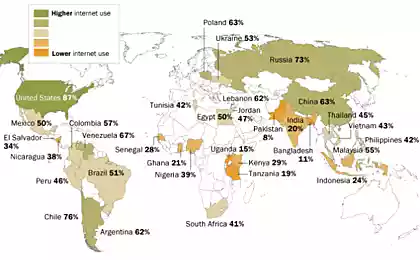505
The US government has lost control over the infrastructure of the Internet

The first of October, the expired contract between ICANN, the international organization responsible for assigning domain names and IP addresses in the Internet, and the National Agency on telecommunications and information administration, as reported on the official website of the organization.
Since 1998, ICANN has managed the assignment of domain names and IP addresses using IANA — another non-profit American organization. The U.S. government had the right of veto in the work of the IANA and, in fact, were controlling the Internet.
Processes the output of the network under control of the United States government began a few years ago. Since 2006, were examined the possibilities of non-renewal of the contract with the National Agency for telecommunications by ICANN, however, the relationship with the U.S. government was finally broken just now.
Recent years, several States were concerned about the sole U.S. influence on the infrastructure of the Internet, which could be used latter with political motives. So, at the conclusion of ICANN under the control of intergovernmental organizations such as the United Nations or the International telecommunication Union (ITU), at the time was made by the Ministry of communications of the Russian Federation.
These proposals had a very specific goal: the transfer of the management of the national domain zones to the national governments. In 2012 Russia's proposal to amend the regulations of the ITU (the transfer of rights by ICANN) and the subsequent transfer of control over the territorial domain names sovereign governments supported such States as China, Iran, Sudan, Saudi Arabia, Algeria and Bahrain. Western countries USA, Canada, Australia and EU member States have opposed such initiatives.
ICANN now completely removed from the influence of any political forces and the process of managing the network infrastructure of the Internet is fully transferred to the private sector.
The Board of the organization hopes to build a dialogue between NGOs, business, scientists, technical experts and sovereign governments on issues of Network management. "... is the best way to ensure that the Internet of tomorrow will remain free, open and accessible, like the Internet of today," — commented on the position of the Chairman of the ICANN Board of Directors Stephen D. Crocker.
According to the newspaper "Vedomosti" the liberalization and transition of the governance of the Internet in private hands were opponents in the face of the U.S. States of Arizona, Texas, Oklahoma and Nevada.
The U.S. Department of defense is actually the Creator of the Internet after the launch in 1969, the ARPANET network. Since then, the Network actively developed, including with the support of the United States, and in 2012, the state claimed exclusive rights to everything about the Internet.
The transition of infrastructure management in private hands, according to the plaintiffs of the above States is detrimental to the national interests of the United States happened with the connivance of the United States, U.S. Department of Commerce, U.S. Secretary of Commerce penny Pritzker, the National Directorate of information and communication (NTIA) and assistant Secretary of the NTIA Lawrence Strickling that all claimed as defendants.
The primary motivation of the lawsuit is that the transition of control over the infrastructure to the ICANN threatens the functioning of the Network as a whole. Previously, ICANN was required to coordinate with the government-controlled by the IANA, but now the contract has expired and the organization can make decisions alone.
The Internet is a strategic region and many States treat the issues of ensuring its functioning as a matter of national security. The output of the Network infrastructure from the control of the United States will be able to partially ease the concerns of sovereign governments on this issue, as well as contribute to the liberalization of Internet.
Source: geektimes.ru/post/281086/






















